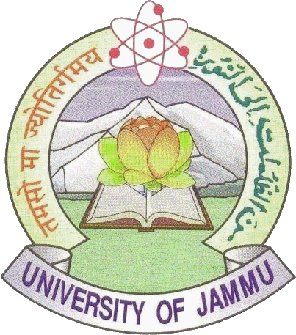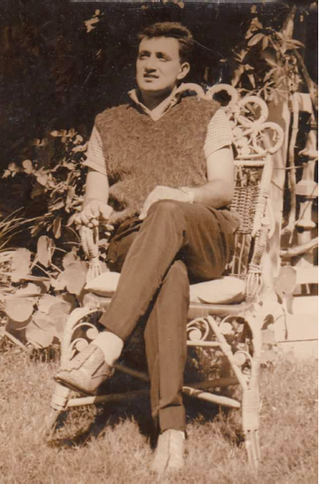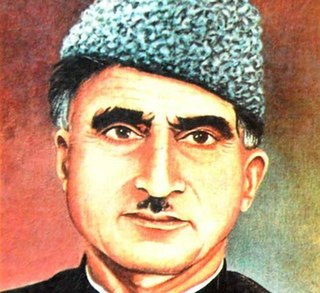
Dogri is an Indo-Aryan language of the Western Pahari group, primarily spoken in the Jammu region of Jammu and Kashmir, India, with smaller groups of speakers in the adjoining regions of western Himachal Pradesh, northern Punjab, and north-eastern Pakistani Punjab. It is the ethnic language of the Dogras, and was spoken in the historical region of Duggar. It is currently spoken in the districts of Kathua, Jammu, Samba, Udhampur, Reasi and other adjoining districts of Jammu Province Unusually for an Indo-European language, Dogri is tonal, a trait it shares with other Western Pahari languages and Punjabi. It has several varieties, all with greater than 80% lexical similarity.

The Sahitya Akademi, India's National Academy of Letters, is an organisation dedicated to the promotion of literature in the languages of India. Founded on 12 March 1954, it is supported by, though independent of the Indian government. Its office is located in Rabindra Bhavan near Mandi House in Delhi.

The University of Jammu informally known as Jammu University (JU), accredited as A++ grade by National Assessment and Accreditation Council (NAAC), was established in 1969 by an act of the state legislature which effectively split the Jammu and Kashmir University into the separate University of Jammu and University of Kashmir.
Ved Rahi is an Indian author predominantly writing in Dogri language. He directed well received mythological serial Meerabai for Doordarshan in 1996 under UTV productions. He is also credited for screenplay and dialogues of various Hindi Bollywood films and TV serials. He directed the Hindi film Veer Savarkar (2001), a bio-epic on the life of Indian revolutionary Vinayak Damodar Savarkar.

The Sahitya Akademi Award is a literary honour in India, which the Sahitya Akademi, India's National Academy of Letters, annually confers on writers of the most outstanding books of literary merit published in any of the 22 languages of the 8th Schedule to the Indian constitution as well as in English and Rajasthani language.
Padma Shri Ram Nath Shastri, known as the "Father of Dogri" for his pivotal role in the revival and resurgence of the Dogri language, was born on 15 April 1914.

Duggar is a cultural and an aspirant state in the northern part of India, comprising the districts of Jammu, Samba, Udhampur, Kathua along with Reasi, Pouni and Katra tehsils of Reasi district of Jammu and Kashmir. It is the historical homeland of the Dogra people and the major spoken language is Dogri.
BP Sharma was a journalist of Jammu and Kashmir, India, who was listed in the Limca Book of Records for becoming the oldest working journalist at the age of 92. He died in 2005 at the age of 97.
Deen Bandhu Sharma was an Indian writer from the State of Jammu and Kashmir. Bandhu Sharma is best known for writing the award-winning book, Meel Patthar (Milestone). It is a collection of short stories that won him the prestigious Sahitya Akademi Award, the second highest literary award of India.

Padma Sachdev was an Indian poet and novelist. She was the first modern woman poet of the Punjabi. She also wrote in Hindi. She published several poetry collections, including Meri Kavita Mere Geet, which won the Sahitya Akademi Award in 1971. She also received the Padma Shri, India's fourth highest civilian award in 2001, and the Kabir Samman for poetry for the year 2007-08 given by Government of Madhya Pradesh, Saraswati Samman for the year 2015, Sahitya Akademi Fellowship in 2019.

Balwant Thakur is an Indian theatre personality and scholar, known for bringing Dogri theatre to international notice. He was honoured by the Government of India, in 2013, by bestowing on him the Padma Shri, the fourth highest civilian award, for his contributions to the field of theatre.
Jitendra Udhampuri is an Indian writer of Dogri, Hindi and Urdu literature. He is a recipient of the Sahitya Akademi Award in 1981. The Government of India honored him in 2010, with the fourth highest civilian award of Padma Shri.
Nilamber Dev Sharma was an Indian scholar and writer of Dogri and English literature, best known for his work, An Introduction to Modern Dogri Literature, the first publication in English about Dogri literature. The Government of India honored Sharma in 2011, with the fourth highest civilian award of Padma Shri.
Lala Mulk Raj Saraf was an Indian journalist and writer, with over seventy years of a distinguished career in journalism and social service. With several firsts to his name, he is most renowned for overcoming all odds to lay the foundation of journalism in J&K, setting up the first printing press, and publishing the region's first newspaper, Ranbir. For his pioneering efforts in enabling a free press in J&K, he is known as the "Father of Journalism in Jammu and Kashmir". A freedom fighter, social reformer, and much loved public figure, he was awarded the Padma Shri in 1976. Saraf established the JDGD Saraf Trust for promoting conscientious journalism in 1985. The Trust has emerged as a highly prestigious institution in the realm of journalism. It has played a crucial role in encouraging the growth of a healthy press by periodically venerating the veterans and decorating the youngsters for their distinctive achievements in the line.

Kunwar Viyogi, born Randhir Singh Jamwal, was a poet, and the only Indian Air Force officer to have received the Sahitya Akademi Award, which was awarded in 1980 for his long Dogri language poem "Ghar." He used "Ghar" [Home] as a peg and strung together 238 four-lines verses embracing a wide variety of subjects and ideas and feelings into a long poem. He is also the youngest poet in the history of Sahitya Akademi to have received this honour. Viyogi is noted for introducing the sonnet, a relatively new and unexplored genre for Dogri writers, into Dogri literature.

Ghulam Mohiuddin Hajni was a Kashmiri writer, critic, political activist and teacher. He wrote in regional and foreign languages such as Urdu, Persian, Arabic and primarily in Kashmiri language. In 1970, he became the recipient of Sahitya Akademi Award for his research publication titled Maqalati Hajini.

Mohammad Zahid is an Indian poet, translator and editor from Anantnag, Kashmir. He is a recipient of Best Book Award from Academy of Art Culture & Languages, J&K for his maiden poetry collection, The Pheromone Trail. He is also a recipient of Jibanananda Das Award for his translation of Kashmiri poetry into English.
Gautam Sharma "Vyathit", is a folklorist, playwright, and poet from Himachal Pradesh, India. He is also known as Gautam Chand Sharma "Vyathit" or just Gautam Vyathit. He is noted for his literary works in Dogri and Hindi, as well as for his various efforts to preserve and nurture the endangered folk arts of Himachal Pradesh, especially those of the Kangra region. Vyathit was the joint recipient of the 2007 Sahitya Akademi Award for his contributions to Himachali languages and literature. 'Vyathit', Gautam Sharma's pen-name in Hindi, means 'pained', or 'distressed'.

Sukrala Mata Mandir is a revered Hindu temple dedicated to the goddess Sukrala Mata, a form of the goddess Mal, Sharada Devi, worshipped in the Duggar region. The temple is located on a hillock at Sukrala village near Najot village north of Billawar town, Kathua district, in Jammu division. The shrine dedicated to the goddess was built by rulers of Jammu and Chamba princely states. Myriads of devotees flock to pay obeisance to the goddess during Navratri festival.
Dogri literature refers to the body of written and oral works in the Dogri language, predominantly spoken in the Jammu region of Jammu and Kashmir, India, and parts of northern Pakistan. Known for its linguistic rhythm and cultural expressions, Dogri literature refers to the traditions, lifestyle, and history of the Dogras. It encompasses poetry, prose, folklore, and modern literary forms, playing a significant role in preserving the region's heritage.










